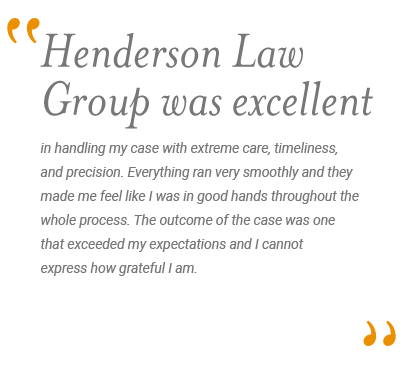Services
Henderson Law Group is a full-service criminal defense firm dedicated to helping individuals fight criminal charges in Missouri and Illinois state, federal, and municipal courts. In addition to our criminal defense practice, we also assist people facing orders of protection, probation violations, sanctions by the Nursing Board, and discipline by a college or university. Please click on our service areas below to learn more about how we can help you with your situation.
Recent Results
-
Assault 1st Degree and Burglary
Probation; No Jail Time Henderson Law Group represented a Florissant woman on charges of assault in the first degree, assault in the second degree, and burglary in the first degree… Read More
-
Order of Protection Appeal
Reversed; Orders of Protection Vacated Henderson Law Group represented a Kirksville husband and wife on appeal to the Missouri Court of Appeals, Western District. Our firm did not represent the… Read More
-
Felony Drug Possession
Case Dismissed Henderson Law Group represented an Atlanta man on one count of felony drug possession in Montgomery County Circuit Court. Our client, who was not a U.S. citizen, was… Read More
Frequently Asked Questions
- -+ If I am being investigated for a crime, should I contact a lawyer?
- -+ What is the difference between a felony and misdemeanor crime?
- -+ What are the stages of a criminal case?
- -+ Can I be released from jail while awaiting trial?
- -+ Can I testify in my own defense at trial?
- -+ Will I have a jury trial to determine my guilt or innocence?
- -+ Are there different types of probation given to defendants?
Absolutely. Having representation at an early stage in the criminal process can significantly increase your chances of no charges being filed or charges being reduced. An attorney can advise you on what rights you have and protect those rights. Additionally, a criminal defense attorney can act as a liaison between you and the investigators, so you do not have to speak with them. Frequently, individuals make the mistake of believing that there is no need to hire a lawyer until they have been arrested. Do not make the same mistake.
A misdemeanor is a crime that is punishable by up to one year in the county jail and a fine of up to $2,000.00, or any combination thereof. Felonies, on the other hand, are more serious crimes which are punishable by more than one year in the Missouri Department of Corrections. If convicted of a felony, prison sentences can range anywhere from one year all the way up to a life sentence or the death penalty, depending on the classification of the felony.
Broadly speaking, the criminal process is initiated once the police make an arrest. Once an arrest has been made, the suspect will go before the judge for a bail hearing to determine what, if any, the amount of bail will be. The next step in the criminal justice process will be an arraignment or preliminary hearing. At this proceeding, the judge informs the accused of the criminal charges against him or her, asks the accused whether he or she has an attorney or wants a court-appointed attorney, asks how the accused will plead to the charges, determines whether to modify the initial amount of bail and sets a schedule for future court dates. In felony cases, a judge will hold a preliminary hearing or grand jury proceeding next to determine whether the prosecution has enough evidence against the accused to proceed to the next step. Next, the accused may wish for his or her attorney to negotiate a plea bargain with the prosecutor. If a plea bargain is reached, the accused will appear in court to plea guilty to the charge and will be sentenced. If the accused doesn’t wish to accept the prosecutor’s plea bargain, the case will proceed to trial.
In most cases, you will have the opportunity to post bond to get out of jail while awaiting trial. The judge will determine the appropriate bail amount. There are several types of bonds the judge can require you to post before releasing you from jail. Many individuals accused of a crime seek help from family or friends to help post bond to get him or her out of jail. A bail agent or bondsman can also help post the bail if you are not able to raise the money needed to post bond yourself.
The 5th Amendment to the U.S. Constitution gives every criminal defendant in a criminal proceeding the right not to testify. Additionally, if a defendant chooses not to testify, jurors will be told that they cannot infer guilt by the defendant’s choice to exercise his or her right to remain silent. A criminal defendant can testify if they choose to do so subject to certain ethical considerations. A skilled criminal defense attorney will advise the defendant of the pros and cons of testifying on his or her own behalf, but the choice is ultimately the defendant’s to make.
In most criminal cases, you will have the right to a jury trial. The U.S. Constitution gives a person accused of a crime punishable by a sentence longer than six months the right to be tried by a jury.
Yes. Generally, probation can be SES or SIS probation. For an in-depth discussion on this topic, please refer to our probation page.
Resources
Latest Blog Posts
-
What You Need To Know About The Stay At Home Order
The state of Missouri and Illinois have issued a stay at home order to help reduce the spread of the coronavirus (COVID-19). The restrictions begin Monday, March 23, 2020, and… Read More
-
COVID-19: What Does It Mean for Your Missouri Court Case?
In response to the national state of emergency due to the coronavirus (COVID-19), the Supreme Court of Missouri suspended all-in person proceedings in all appellate and circuit courts, including all… Read More
-
Immunity from Prosecution When Seeking Medical Assistance for Drug Overdose
Title XII, Chapter 195, Section 195.205 provides immunity from liability for seeking or obtaining medical assistance for a drug overdose. In Missouri, a drug or alcohol related overdose includes, but… Read More
- View More here
Latest Take on the News
-
The Hunt – Jury Selection for the “El Chapo” Trial Has Commenced
Joaquin Archivaldo Guzman Loera, also know as “El Chapo,” is considered to be the world’s most powerful drug trafficker. He is known for being the boss of the Sinaloa drug… Read More
-
Canada Legalizes Recreational Marijuana – What This Means For Travelers From The United States
Today, October 17, 2018, Canada announces the national legalization of marijuana. But what does this mean for travelers? Marijuana use can still be regulated by cities. For example, the city… Read More
-
The “Drug Llama” Indicted on Illegal Drug Distribution
The distribution and recreational use of illegal prescription drugs is arguably considered an epidemic throughout the United States. Many illegal distributors use the dark web for selling their “product.” Melissa… Read More
- View More here



